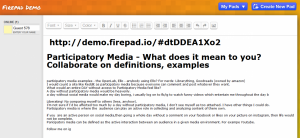Today we reviewed the guidelines for the research paper outline (due Wednesday 4/15) and the research paper draft (due on April 27 – 2 weeks from today!) and played the evaluation game. Two teams (Alessandra, Kelly, Jay; Wil, Jonathan, Adonas) received perfect scores, so we’ll have a tie-breaking round on Wednesday, time permitting. On Wednesday we will discuss writing a research paper. Please read Badke, chapter 10 and Appendix One, pp. 263-286.
Before Break, I overlooked assigning 2 articles that discuss the importance of evaluating information in any format. Please read the following 2 articles: Fister, The Devil in the Details and Grimmelman, The Google Dilemma. Write a 100-word reading response blog post by 10 a.m. on Thursday, April 16.
Remember, your research paper outline is due on Wednesday, April 15 by 10 a.m., preferably emailed to me as an attachment, though you may submit a printed copy in class that day. Questions about this assignment? Get in touch!
~Prof. Leonard



